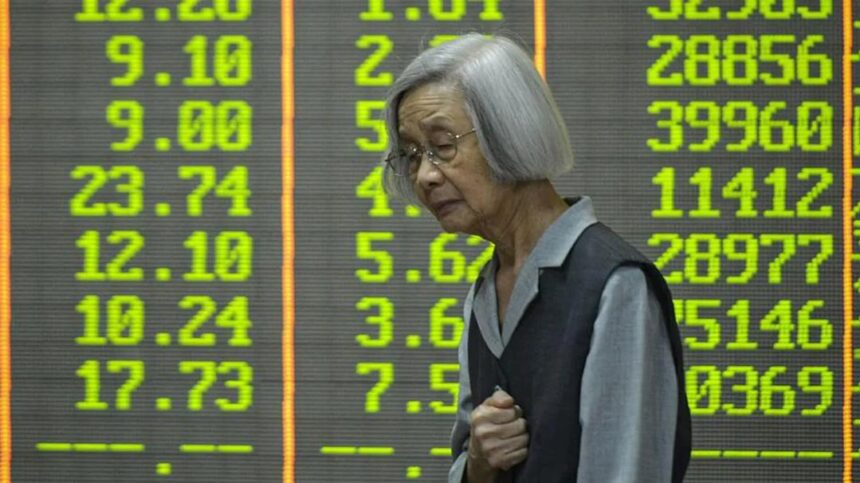Asian stock markets endured their steepest losses in decades on Monday, as President Donald Trump’s sweeping new tariffs sent shockwaves through the global economy.
Major indices across the region plummeted, dragging down investor confidence and igniting fears of a looming global recession.
The Shanghai Composite Index dropped more than 8% at one point before closing 7.3% lower, while Japan’s Nikkei 225 shed 7.8%. The Hang Seng Index in Hong Kong plunged 13.22% — its biggest single-day drop since the 2008 financial crisis. South Korea’s Kospi fell 5.6%, and Australia’s ASX 200 lost 4.2%.
The rout followed Trump’s announcement of a new tariff regime ranging from 10% to 54% on imports from most countries. While a flat 10% tariff is now in place for allies such as Singapore, Australia, and New Zealand, some Asian economies face far steeper rates. China will bear the brunt with a 54% tariff, while Vietnam and Cambodia face levies of 46% and 49%, respectively.
“This is a bloodbath,” one analyst told the BBC. “Markets are reacting not just to tariffs but to the broader implication that a full-blown global trade war is back on the table.”
Economies in Asia, many of which are export-driven, are particularly vulnerable to shifts in US trade policy. A slowdown or recession in the United States — the world’s largest economy — would significantly reduce demand for Asian exports, ranging from electronics and garments to automobiles.
Investment firm Vanguard’s Asia Pacific chief economist, Qian Wang, noted: “Asia is bearing the brunt of the US tariff hike. While there could be room for negotiation, a new regime of higher tariffs appears here to stay.”
US brands such as Nike and Lululemon rely heavily on Vietnam for manufacturing, and Bangladesh exports over $8.4 billion in garments annually to the US. The South Asian nation now faces a 37% tariff, according to the Bangladesh Garment Manufacturers and Exporters Association, potentially dealing a severe blow to its economy.
Taiwan also felt the heat, with its Weighted Index suffering a 9.7% fall — the largest in its history. The sell-off was exacerbated by delayed reactions, as markets in Taiwan, China, and Hong Kong were closed for holidays when the tariffs were announced last week.
European markets were not spared. The UK’s FTSE 100 fell nearly 5%, its steepest loss in five years, while stock exchanges in Germany and France recorded similar slumps. On Wall Street, all three major US indices dropped more than 5% on Friday, capping the worst week for American stocks since 2020.
Goldman Sachs now places the likelihood of a US recession within the next year at 45%, up from 35%, while JPMorgan has raised its estimate to 60%. Analysts say the combination of inflation fears, declining consumer confidence, and aggressive trade policies could plunge the world into a prolonged downturn.
“Tariffs are feeding into expectations around inflation and a recession,” said Julia Lee, head of client coverage at FTSE Russell. “The global sell-off may continue as US futures point to another difficult session on Wall Street.

